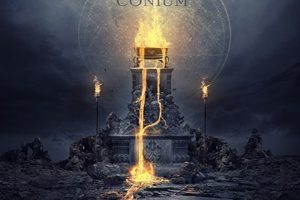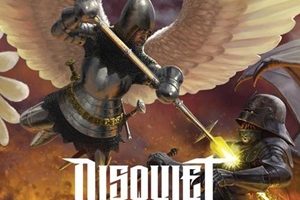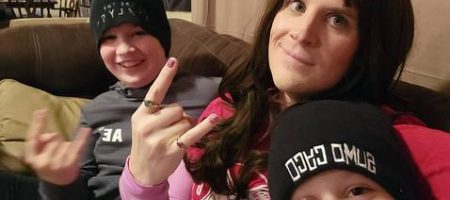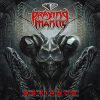Delain – Wading in Dark Waters
Sunday, 29th January 2023
During the pandemic, significant changes took place behind the scenes for Dutch symphonic metal veterans Delain. So much so, it was up for debate whether the group would continue as a project or a full-fledged touring entity, as founder Martijn Westerholt is the sole member remaining from the Apocalypse & Chill record of 2020. As you’ll learn in this interview though, the new version of Delain contains a mix of previous musicians returning plus new additions – including the magnificent voice of Diana Leah. The latest album Dark Waters should allay any possible fears that the melodic, high quality style of the group hasn’t lost any impact in terms of songwriting, performances, or memorable tracks.
We reached out Martijn who was happy to fill us in on what took place for the dissolution of the previous lineup plus resurrection, how the songwriting process works best, seeking out his wife for lyrical contributions with Dark Waters, thoughts on the state of metal in the current scene, his son’s interest in metal that took place organically, plus what touring looks like for Delain over the next year or so.
Dead Rhetoric: Dark Waters is the latest Delain studio album. You’ve gone through a major lineup shift – with two older members returning and two newer members leaving you as the lone original member. How did these changes come about – and do you think this puts any additional pressure or attention on this new release to appease the faithful followers of Delain globally?
Martijn Westerholt: That’s a good question – and that deserves a long answer! (laughs). Yeah, how did that come about? I got into a burnout in 2019 because Delain was doing really well. I’m responsible for a lot of things within Delain. If there are some gaps in the organization, if we don’t have a tour manager, I’m the one who has to plug the holes. Everything came at the same time, the same moment. I had to organize the tour for North America, Europe, we had a video shoot coming up, the new album Apocalypse & Chill was also being mixed, I am the producer, so I had to give some feedback, check in, etc. All of that was going on, and it was insanity! (laughs). I needed to take it easy, so I talked with our previous singer Charlotte and for now, I needed to not play 100 shows a year anymore, 50 would be nice. We wanted to talk to the other three guys about it – but they beat us to it.
They talked to us and wanted major changes in the band. It was a big puzzle, and then COVID hit. We tried to figure it out for a year, a long process and we couldn’t figure it out. The three guys left, and our singer Charlotte said if we had so many people leaving, then I would rather leave and focus on my own career. Suddenly I was alone, the end has happened. When this process was done, would I stop Delain or is there enough Delain DNA present to continue? In the beginning, I thought that was it – but at a certain point I thought no, I would like to continue and it started as a project, so perhaps Delain could continue as a project. I was in touch with a lot of people in our music scene, musicians and friends. All the old Delain members – and some of them wanted to get back in. The reason why they originally left is when you are thirty years old, sometimes you want to focus either on your music career or focus on a social life and a normal career. They pursued the latter, but now they are forty, and Delain fits in their lives again. Their lives are settled, they have kids but they are grown. They returned… and now there is so much Delain DNA present, I could think of this as a band – and they convinced me too of this. And here we are.
Most of that pressure I already had with the release of our first single. I really felt nervous, how are fans going to respond to this? Because we have a very loyal fan base. In vast majority, they welcomed the new members and sound with open arms. More than I hoped for, or even dream of. Right now, the pressure is gone. The other thing is, when it comes to the writing of Delain, I wrote most of the stuff together with my co-writer Guus (Eikens). He was always present in the team that wrote the albums. I was not afraid of the sound. When it comes to the singer, that can be a challenge, but as far as the rest, I had confidence in those parts.
Dead Rhetoric: How did the songwriting and recording sessions go for this set of material? Were there any surprises, obstacles or challenges beyond the pandemic that took place – and where do you see this album sitting against the previous discography for the group?
Westerholt: I have to say, the whole album process felt like business as usual. Because as I said, I work the same way and worked with most of the same people as I had in the past. The last album our guitar player did a bit more. I worked with the same mixing engineer, orchestral arranger, even guests that I worked with before too. When I compare this album to the rest of the catalog, it fits really like flawlessly. The singer is the biggest difference. She has some traits that are very fitting and compatible to Delain. Even the artwork, we work with the same guy we had worked with in the past. It’s a logical continuation.
Dead Rhetoric: Did you have any concerns about what singles to present with this new lineup to make the right impression?
Westerholt: Not concern, because I really believed in this lineup and the songs. It’s more about which songs to choose first. We chose a song first where everybody in the band would be represented very well, “The Quest and the Curse”, everybody is doing their thing on there. For the rest, it was not as much of a concern, no.
Dead Rhetoric: How did the guest appearances come about, which include Paolo Ribaldini, Marco Hietala (formerly of Nightwish), Rob Van Der Loo of Epica, and Ruud Jolie of Within Temptation? Do you enjoy these special colors you add with the guests on your material?
Westerholt: Oh yes, I love it. It adds a different flavor. When it comes to Marco, he has been on three previous albums of Delain. He’s a long-time friend, it was wonderful to work with him and have him on the album again. His voice fits so well. Ruud joined Within Temptation after I left, but he’s a part of the Within Temptation family. My family is still in there, so there is a big connection. It’s a full circle, people returning, friends, and that’s wonderful when you can make music together. It’s a real kind of magic you have in this room, it’s fantastic.
Dead Rhetoric: What is your approach when it comes to the development of a song? Do you have to get into a certain zone or can creativity and ideas come at any point of the day, at any time, and you just have to capture things like lightning in a bottle?
Westerholt: In my case, what I need is peace and tranquility. Not too much on my mind. I’ll sit here in my studio and I’ll just start playing. There are a few moments where I start watching a movie and I get inspired by a film score for example. It’s just playing around; it comes sometimes, and it doesn’t others.
Dead Rhetoric: Where did you want to go with the lyrical content for this record?
Westerholt: Well, things in the past our previous singer Charlotte handled all the lyrics. She was fantastic at that; she had a big talent for it. Right now, I was like how are we going to approach that part. I have the luck that I am married to a native English speaker from America, she’s originally from California. The luck continues, she loves languages, poetry, and lyrics. She wrote some lyrics already, and she loves heavy metal. For me, it was a good choice for her to try something. I never in the past before the split happened, I would have thought to ask her. It was an organic process; she wrote about 80% of the album. She took inspiration from how I experienced the later years of Delain, but also other things. You can hear a little bit back on the album, on the title track especially and a couple of the other songs.
Dead Rhetoric: Given your time in Within Temptation previously with your brother Robert, are there times where you share notes and compare stories on how you handle the activities of your respective bands currently, especially when it comes to the business side of things?
Westerholt: Not like that. Of course when we see each other, we do talk about it. We update each other on how we are doing. What are you up to? Not in a structural way, but a spontaneous way. Not subconsciously, we are able to separate our stuff. If I have a question, I can always call him and ask him – and it works the other way around. We know each other, we are family, and that is wonderful.
Dead Rhetoric: What do you believe have been some of the major keys to success for Delain when assessing the career arc over the twenty-one plus years as a band?
Westerholt: Consistency in the sound. That’s very important. The style of music – there is a huge fanbase for it. It hits you from the heart, that sounds cheesy but that’s how it is. We play live a lot, those are very good factors that can help with success. In the end, the fans decide what they like and what they don’t like, and also you are dependent on your singer and band members. In general, it’s the songwriting and the vocals that are the main factors if something works or not.
Dead Rhetoric: Considering the numerous health issues you’ve dealt with over the years as a musician, how is your health these days – and do you have to be conscientious even on the road as far as your diet and lifestyle to ensure maximum energy for these performances?
Westerholt: Good one! Yes, that is important. Not so much in diet, but everything is a given, it’s about balance. Things in moderation. You can have an alcoholic drink every now and then – but don’t overdo it. I’m not going to drink every night. At home I barely drink at all. Make sure I sleep enough, that you move enough. Those are things that really help. Things have to be in moderation. One of the factors led to my burnout, because things were not in moderation. Doing way too much.
Dead Rhetoric: What would surprise people to learn about Martijn the person outside of who you are as a musician?
Westerholt: I hope people won’t be (surprised) because I don’t like to act differently than I am. I don’t believe in that way of working – if I don’t already believe in what I am doing or who I am on stage, how can I convince other people that I am somebody else? I’m an approachable, down to earth person. I always regarding communicating live and here with interviews like I am at a bar having a drink and talking to somebody. It keeps things entertaining as well.
Dead Rhetoric: How do you view the state of the metal/heavy music scene today? What excites you about the industry – and what changes (if any) would you like to make for the greater good of all parties involved?
Westerholt: I think the metal community is very robust. It’s getting older, because the people who are into metal when they were young in the 80’s, that’s okay. On the other hand, you see some young people getting into metal. What I am a little bit concerned about is the amount of big bands appearing. There are a couple of exceptions you can name that became big in the last decade, Sabaton for example, Ghost perhaps. That’s kind of it. Those are the ones that pop up. Because of the internet development, social media, it’s easier to connect directly with the fans, so you can not manipulate that well as you could in the past with the music industry saying, we offer this to the crowd, and that’s it. Now the crowd themselves decides what they like, the numbers grow on certain acts, and that’s a good thing. So, there are pros and cons.
Dead Rhetoric: When you feel excessive stress or emotional overload, what types of activities or measures do you take to refocus and regain the right state of mind?
Westerholt: Laying on a sofa, watching a show or a YouTube video. Playing a game. Spending some time with my wife or my son. I like the game Skyrim for example, there is a Harry Potter Legacy game coming out in February, and I will play on the PlayStation.
Dead Rhetoric: Has your son shown an interest not only in metal music but the desire to play an instrument himself?
Westerholt: Yes, he plays the drums. I didn’t push any music; he could choose himself what he likes. The fun thing is, he does like metal a lot. He loves Beast in Black, Rhapsody, and he’s just ten years old. He plays drums and he plays within the musical program at school, he does band.
Dead Rhetoric: Thinking back over your lifetime as a musician, has there been any failure or setback that happened that maybe in retrospect set you up for a future, successful outcome down the line?
Westerholt: Yeah. The most recent one with the split in the last lineup. Because what doesn’t break you makes you stronger, they say. I think that is true. You learn from your failures; you learn from your mistakes. And I think that’s a good thing. That’s a good example. On the other hand, it remains to be seen how successful this will be. So far, I’m really, really happy and I feel spoiled with the reactions.
Dead Rhetoric: What’s on the agenda for Delain over the next twelve months regarding activities, touring, festival appearances, etc.?
Westerholt: We are about to tour – we will start a bit carefully because of the COVID postponements and regulations in other countries. I want to give the fans the opportunity to get used to the new lineup. We will do a European tour in April and May, we will do some festivals in the summer, Wacken and Graspop for example. And there will be more touring during the fall, I love touring.




























